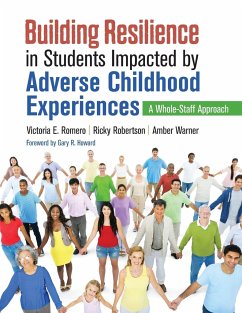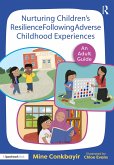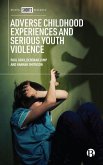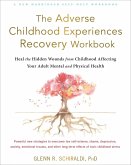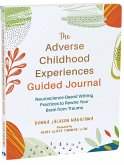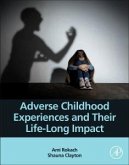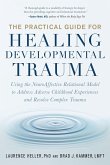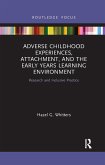Victoria E. Romero, Ricky Robertson, Amber N. Warner
Building Resilience in Students Impacted by Adverse Childhood Experiences
A Whole-Staff Approach
Victoria E. Romero, Ricky Robertson, Amber N. Warner
Building Resilience in Students Impacted by Adverse Childhood Experiences
A Whole-Staff Approach
- Broschiertes Buch
- Merkliste
- Auf die Merkliste
- Bewerten Bewerten
- Teilen
- Produkt teilen
- Produkterinnerung
- Produkterinnerung
Use trauma-informed strategies to give students the skills and support they need to succeed in school and life Nearly half of all children have been exposed to at least one adverse childhood experience (ACE), such as poverty, divorce, neglect, substance abuse, or parent incarceration. This workbook-style resource shows K-12 educators how to integrate trauma-informed strategies into daily instructional practice through expanded focus on: The experiences and challenges of students impacted by ACEs, including suicidal tendencies, cyberbullying, and drugs Behavior as a form of communication and…mehr
Andere Kunden interessierten sich auch für
![Nurturing Children's Resilience Following Adverse Childhood Experiences Nurturing Children's Resilience Following Adverse Childhood Experiences]() Mine ConkbayirNurturing Children's Resilience Following Adverse Childhood Experiences29,99 €
Mine ConkbayirNurturing Children's Resilience Following Adverse Childhood Experiences29,99 €![Adverse Childhood Experiences and Serious Youth Violence Adverse Childhood Experiences and Serious Youth Violence]() Paul Gray (Manchester Metropolitan University)Adverse Childhood Experiences and Serious Youth Violence61,99 €
Paul Gray (Manchester Metropolitan University)Adverse Childhood Experiences and Serious Youth Violence61,99 €![The Adverse Childhood Experiences Recovery Workbook The Adverse Childhood Experiences Recovery Workbook]() Schiraldi, Glenn R, PhDThe Adverse Childhood Experiences Recovery Workbook22,99 €
Schiraldi, Glenn R, PhDThe Adverse Childhood Experiences Recovery Workbook22,99 €![The Adverse Childhood Experiences Guided Journal The Adverse Childhood Experiences Guided Journal]() Donna J. NakazawaThe Adverse Childhood Experiences Guided Journal18,99 €
Donna J. NakazawaThe Adverse Childhood Experiences Guided Journal18,99 €![Adverse Childhood Experiences and Their Life-Long Impact Adverse Childhood Experiences and Their Life-Long Impact]() Ami Rokach (Psychology Department, York University, Toronto, CanadaAdverse Childhood Experiences and Their Life-Long Impact150,99 €
Ami Rokach (Psychology Department, York University, Toronto, CanadaAdverse Childhood Experiences and Their Life-Long Impact150,99 €![The Practical Guide for Healing Developmental Trauma The Practical Guide for Healing Developmental Trauma]() Laurence HellerThe Practical Guide for Healing Developmental Trauma26,99 €
Laurence HellerThe Practical Guide for Healing Developmental Trauma26,99 €![Adverse Childhood Experiences, Attachment, and the Early Years Learning Environment Adverse Childhood Experiences, Attachment, and the Early Years Learning Environment]() Hazel G. Whitters (UK Glasgow Voluntary Organisation)Adverse Childhood Experiences, Attachment, and the Early Years Learning Environment35,99 €
Hazel G. Whitters (UK Glasgow Voluntary Organisation)Adverse Childhood Experiences, Attachment, and the Early Years Learning Environment35,99 €-
-
-
Use trauma-informed strategies to give students the skills and support they need to succeed in school and life Nearly half of all children have been exposed to at least one adverse childhood experience (ACE), such as poverty, divorce, neglect, substance abuse, or parent incarceration. This workbook-style resource shows K-12 educators how to integrate trauma-informed strategies into daily instructional practice through expanded focus on: The experiences and challenges of students impacted by ACEs, including suicidal tendencies, cyberbullying, and drugs Behavior as a form of communication and how to explicitly teach new behaviors How to mitigate trauma and build innate resiliency
Hinweis: Dieser Artikel kann nur an eine deutsche Lieferadresse ausgeliefert werden.
Hinweis: Dieser Artikel kann nur an eine deutsche Lieferadresse ausgeliefert werden.
Produktdetails
- Produktdetails
- Verlag: SAGE Publications Inc
- Seitenzahl: 250
- Erscheinungstermin: 11. Juni 2018
- Englisch
- Abmessung: 280mm x 216mm x 14mm
- Gewicht: 606g
- ISBN-13: 9781544319414
- ISBN-10: 154431941X
- Artikelnr.: 50686850
- Herstellerkennzeichnung
- Libri GmbH
- Europaallee 1
- 36244 Bad Hersfeld
- gpsr@libri.de
- Verlag: SAGE Publications Inc
- Seitenzahl: 250
- Erscheinungstermin: 11. Juni 2018
- Englisch
- Abmessung: 280mm x 216mm x 14mm
- Gewicht: 606g
- ISBN-13: 9781544319414
- ISBN-10: 154431941X
- Artikelnr.: 50686850
- Herstellerkennzeichnung
- Libri GmbH
- Europaallee 1
- 36244 Bad Hersfeld
- gpsr@libri.de
Victoria Romero is an educator with over 42 years of experience working as a classroom teacher, principal, and leadership coach. She continues to coach administrators, directors, principals, vice principals, and school leadership teams for equity and sustainable school improvement in three school districts in Washington. Victoria is a certified consultant and lead author of two Corwin Press books, "Building Resilience in Students Impacted by Adverse Childhood Experiences: A Whole Staff Approach" (2018) and "Race Resilience: Achieving Equity Through Self and Systems Transformation" (2021). Both books focus on the impact of traumatization as it relates to social-emotional needs of students as well as how to create school cultures that foster resilience. In her more recent work, Victoria provides guidance to school staff in engaging in authentic dialogue about how racialization and racial positioning influences perceptions, behaviors, expectations, and decisions. Her guiding framework emphasizes that systems will change when the people working in them change.
Foreword by Gary R. Howard
Preface
Acknowledgments
About the Authors
Chapter 1 ACEs and the New Normal
ACEs Are an Equal Opportunity Occurrence
Lost in Translation
The New Normal
Chapter 2 Put on Your Own Oxygen Mask Before Helping Others
Burnout or Compassion Fatigue?
The New Normal: A Case Study Intervention
Self-Care Is an Ethical Imperative
WWAD?
Chapter 3 It's Easy to Have High Expectations-Hard to Grow a New Mindset
Knowing Myself Precedes Teaching Students
Knowing My Students and Knowing Pedagogy-Growing Mindset
Knowing My Strengths, Knowing the Strengths of My Students Fosters
Resiliency
"I Can't Learn From You Because You're White"
Progress Not Perfection
Knowing Myself and Responding to Change Are About Self-Care
Knowing Myself Matters-Because When Negative Bias Shows Up, Students Are
Miseducated
Good Teaching Is Not Enough-The New Normal Warrants Transformationist
Teaching
Chapter 4 The Effects of Trauma on the Brain
Acknowledging That Trauma Is Sitting in the Classroom Is Transformational
Teaching
ACEs and Learning
ACEs and Behavior
Trauma Has Many Forms
If I Knew Then What I Know Now
Chapter 5 Teaching Behaviors, Differentiating Interventions, Changing
Pedagogy
Relationships Precede Learning
Talk, Trust, Feel, Repair
Schools and Classrooms Have a Culture and Culture Is Learned
Response to Intervention (RTI)
Looking at Behavior Management Through a Trauma-Informed Lens
Change Is Hard and Leadership Matters
Talk, Trust, Feel, Repair: My Rookie Year
Schools Are Ideal for Social Working
Chapter 6 Plan With the End in Mind: Visioning a Compassionate School
The Innovative School District PreK-12th Grades
SEL Data Team/Self-Assessment Checklist
Case Study: ISD's Response to Behavior Interventions
Changing Positions to Change Lives
What Does It Mean to Work in a Trauma-Informed School or School District?
Chapter 7 From Theory to Practice: Transformationist Actions Convert ACEs
to Aces
Transformationist Schools and School Districts
Transformationist Instructional Staff
Transformationist School Counselors and School-Based Social Workers
Transformationist School Psychologists and School Nurses
Transformationist Support Staff (Office, Cafeteria, Custodial, Bus Drivers)
Chapter 8 The Process, the Plan, the Transformation
The Process
Step 1: Assessing Capacity
Step 2: Building Capacity
Step 3: Implementation
Step 4: Evaluating Program Effectiveness
Where Is Our Sense of Urgency?
The Plan: Implementation Guide to Transformation
Implementation
Evaluation and Planning
Chapter 9 In Their Own Words
Antwone Fisher
Cleressa Brown
Conor Black
Maria Gonzales
The Salomon Martinez Family
Additional Reading and Resources
Glossary of Terms
References
Index
Preface
Acknowledgments
About the Authors
Chapter 1 ACEs and the New Normal
ACEs Are an Equal Opportunity Occurrence
Lost in Translation
The New Normal
Chapter 2 Put on Your Own Oxygen Mask Before Helping Others
Burnout or Compassion Fatigue?
The New Normal: A Case Study Intervention
Self-Care Is an Ethical Imperative
WWAD?
Chapter 3 It's Easy to Have High Expectations-Hard to Grow a New Mindset
Knowing Myself Precedes Teaching Students
Knowing My Students and Knowing Pedagogy-Growing Mindset
Knowing My Strengths, Knowing the Strengths of My Students Fosters
Resiliency
"I Can't Learn From You Because You're White"
Progress Not Perfection
Knowing Myself and Responding to Change Are About Self-Care
Knowing Myself Matters-Because When Negative Bias Shows Up, Students Are
Miseducated
Good Teaching Is Not Enough-The New Normal Warrants Transformationist
Teaching
Chapter 4 The Effects of Trauma on the Brain
Acknowledging That Trauma Is Sitting in the Classroom Is Transformational
Teaching
ACEs and Learning
ACEs and Behavior
Trauma Has Many Forms
If I Knew Then What I Know Now
Chapter 5 Teaching Behaviors, Differentiating Interventions, Changing
Pedagogy
Relationships Precede Learning
Talk, Trust, Feel, Repair
Schools and Classrooms Have a Culture and Culture Is Learned
Response to Intervention (RTI)
Looking at Behavior Management Through a Trauma-Informed Lens
Change Is Hard and Leadership Matters
Talk, Trust, Feel, Repair: My Rookie Year
Schools Are Ideal for Social Working
Chapter 6 Plan With the End in Mind: Visioning a Compassionate School
The Innovative School District PreK-12th Grades
SEL Data Team/Self-Assessment Checklist
Case Study: ISD's Response to Behavior Interventions
Changing Positions to Change Lives
What Does It Mean to Work in a Trauma-Informed School or School District?
Chapter 7 From Theory to Practice: Transformationist Actions Convert ACEs
to Aces
Transformationist Schools and School Districts
Transformationist Instructional Staff
Transformationist School Counselors and School-Based Social Workers
Transformationist School Psychologists and School Nurses
Transformationist Support Staff (Office, Cafeteria, Custodial, Bus Drivers)
Chapter 8 The Process, the Plan, the Transformation
The Process
Step 1: Assessing Capacity
Step 2: Building Capacity
Step 3: Implementation
Step 4: Evaluating Program Effectiveness
Where Is Our Sense of Urgency?
The Plan: Implementation Guide to Transformation
Implementation
Evaluation and Planning
Chapter 9 In Their Own Words
Antwone Fisher
Cleressa Brown
Conor Black
Maria Gonzales
The Salomon Martinez Family
Additional Reading and Resources
Glossary of Terms
References
Index
Foreword by Gary R. Howard
Preface
Acknowledgments
About the Authors
Chapter 1 ACEs and the New Normal
ACEs Are an Equal Opportunity Occurrence
Lost in Translation
The New Normal
Chapter 2 Put on Your Own Oxygen Mask Before Helping Others
Burnout or Compassion Fatigue?
The New Normal: A Case Study Intervention
Self-Care Is an Ethical Imperative
WWAD?
Chapter 3 It's Easy to Have High Expectations-Hard to Grow a New Mindset
Knowing Myself Precedes Teaching Students
Knowing My Students and Knowing Pedagogy-Growing Mindset
Knowing My Strengths, Knowing the Strengths of My Students Fosters
Resiliency
"I Can't Learn From You Because You're White"
Progress Not Perfection
Knowing Myself and Responding to Change Are About Self-Care
Knowing Myself Matters-Because When Negative Bias Shows Up, Students Are
Miseducated
Good Teaching Is Not Enough-The New Normal Warrants Transformationist
Teaching
Chapter 4 The Effects of Trauma on the Brain
Acknowledging That Trauma Is Sitting in the Classroom Is Transformational
Teaching
ACEs and Learning
ACEs and Behavior
Trauma Has Many Forms
If I Knew Then What I Know Now
Chapter 5 Teaching Behaviors, Differentiating Interventions, Changing
Pedagogy
Relationships Precede Learning
Talk, Trust, Feel, Repair
Schools and Classrooms Have a Culture and Culture Is Learned
Response to Intervention (RTI)
Looking at Behavior Management Through a Trauma-Informed Lens
Change Is Hard and Leadership Matters
Talk, Trust, Feel, Repair: My Rookie Year
Schools Are Ideal for Social Working
Chapter 6 Plan With the End in Mind: Visioning a Compassionate School
The Innovative School District PreK-12th Grades
SEL Data Team/Self-Assessment Checklist
Case Study: ISD's Response to Behavior Interventions
Changing Positions to Change Lives
What Does It Mean to Work in a Trauma-Informed School or School District?
Chapter 7 From Theory to Practice: Transformationist Actions Convert ACEs
to Aces
Transformationist Schools and School Districts
Transformationist Instructional Staff
Transformationist School Counselors and School-Based Social Workers
Transformationist School Psychologists and School Nurses
Transformationist Support Staff (Office, Cafeteria, Custodial, Bus Drivers)
Chapter 8 The Process, the Plan, the Transformation
The Process
Step 1: Assessing Capacity
Step 2: Building Capacity
Step 3: Implementation
Step 4: Evaluating Program Effectiveness
Where Is Our Sense of Urgency?
The Plan: Implementation Guide to Transformation
Implementation
Evaluation and Planning
Chapter 9 In Their Own Words
Antwone Fisher
Cleressa Brown
Conor Black
Maria Gonzales
The Salomon Martinez Family
Additional Reading and Resources
Glossary of Terms
References
Index
Preface
Acknowledgments
About the Authors
Chapter 1 ACEs and the New Normal
ACEs Are an Equal Opportunity Occurrence
Lost in Translation
The New Normal
Chapter 2 Put on Your Own Oxygen Mask Before Helping Others
Burnout or Compassion Fatigue?
The New Normal: A Case Study Intervention
Self-Care Is an Ethical Imperative
WWAD?
Chapter 3 It's Easy to Have High Expectations-Hard to Grow a New Mindset
Knowing Myself Precedes Teaching Students
Knowing My Students and Knowing Pedagogy-Growing Mindset
Knowing My Strengths, Knowing the Strengths of My Students Fosters
Resiliency
"I Can't Learn From You Because You're White"
Progress Not Perfection
Knowing Myself and Responding to Change Are About Self-Care
Knowing Myself Matters-Because When Negative Bias Shows Up, Students Are
Miseducated
Good Teaching Is Not Enough-The New Normal Warrants Transformationist
Teaching
Chapter 4 The Effects of Trauma on the Brain
Acknowledging That Trauma Is Sitting in the Classroom Is Transformational
Teaching
ACEs and Learning
ACEs and Behavior
Trauma Has Many Forms
If I Knew Then What I Know Now
Chapter 5 Teaching Behaviors, Differentiating Interventions, Changing
Pedagogy
Relationships Precede Learning
Talk, Trust, Feel, Repair
Schools and Classrooms Have a Culture and Culture Is Learned
Response to Intervention (RTI)
Looking at Behavior Management Through a Trauma-Informed Lens
Change Is Hard and Leadership Matters
Talk, Trust, Feel, Repair: My Rookie Year
Schools Are Ideal for Social Working
Chapter 6 Plan With the End in Mind: Visioning a Compassionate School
The Innovative School District PreK-12th Grades
SEL Data Team/Self-Assessment Checklist
Case Study: ISD's Response to Behavior Interventions
Changing Positions to Change Lives
What Does It Mean to Work in a Trauma-Informed School or School District?
Chapter 7 From Theory to Practice: Transformationist Actions Convert ACEs
to Aces
Transformationist Schools and School Districts
Transformationist Instructional Staff
Transformationist School Counselors and School-Based Social Workers
Transformationist School Psychologists and School Nurses
Transformationist Support Staff (Office, Cafeteria, Custodial, Bus Drivers)
Chapter 8 The Process, the Plan, the Transformation
The Process
Step 1: Assessing Capacity
Step 2: Building Capacity
Step 3: Implementation
Step 4: Evaluating Program Effectiveness
Where Is Our Sense of Urgency?
The Plan: Implementation Guide to Transformation
Implementation
Evaluation and Planning
Chapter 9 In Their Own Words
Antwone Fisher
Cleressa Brown
Conor Black
Maria Gonzales
The Salomon Martinez Family
Additional Reading and Resources
Glossary of Terms
References
Index

